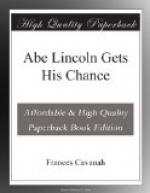A dispute between men in Pigeon Creek usually ended in a fight. Tom Lincoln doubled up his fists. “Put them up, Carter.”
The two men rolled over and over in a confused tangle of arms and legs. Now Tom Lincoln was on top. Now it was John Carter. “Go it, Pa,” Abe shouted from the fence. “Don’t let that old skinflint get you down.” After a few minutes. Carter lay on his back gasping for breath.
“Nuf!” he cried, and Tom let him scramble to his feet.
Carter began brushing himself off. “It ain’t fitting to fight a neighbor,” he whined, “just because of a mistake.”
“Mistake nothing!” Tom snorted. “Somebody lied, and it wasn’t Abe.”
“I’ll have a new paper made out, if you like,” said Carter.
Tom looked at him with scorn. “You ain’t got enough money to buy my south field. But I’ll thank you for the ten cents you owe us. Abe and I each did a half day’s work.”
[Illustration]
Tom’s right eye was swelling, and by the time he reached home it was closed. The bump on the side of his head was the size of a hen’s egg. There was a long scratch down his cheek.
Sarah was kneeling before the fireplace, raking ashes over the potatoes that she had put in to bake. She jumped up in alarm.
“What’s the matter? What happened?” she asked.
“It was like Pa said,” Abe told her. “Mr. Carter is a skinflint.”
Sarah took Tom by the arm and made him sit down on a stool. She touched the swollen eye with gentle fingers.
“It don’t hurt much,” he said.
“I reckon Mr. Carter hurts more,” Abe spoke up again. “He has two black eyes.”
Tom slapped his thigh and roared with laughter. “He sure does. But if it hadn’t been for Abe—”
He stopped, embarrassed. Sarah was soaking a cloth in a basin of cold water. She laid it on his eye.
“What started it all?”
“You tell them, Abe,” said Tom.
“That Mr. Carter ain’t as smart as he thinks he is,” Abe explained. “He had a paper for Pa to sign and tried to make out it was for just the south field. And do you know what, Mamma? When Pa asked me to read it, why, it was for almost our whole farm.”
“You don’t mean to tell me!” said Sarah.
“Carter said he’d have a new paper made out. But I told him,” Tom added with a touch of pride, “I could do without his money.”
“Good for you!” Sarah said, beaming. “Don’t you fret. We’ll squeak through somehow. But what if you had signed that paper? The farm would have been sold right out from under us. I reckon we can feel mighty proud of Abe.”
“Well,” Tom admitted, “it didn’t hurt that he knew how to read. When did you say Mr. Swaney aims to start his school?”
“Right after harvest,” said Abe before his stepmother had a chance to answer.
Tom ignored him and went on talking to his wife. “Now, mind you, Sairy, I ain’t saying Abe needs any more eddication. I ain’t saying it is fitting a son should know more’n his pa. But if you think the young ones should go to this new school for a spell, I won’t say no.”




